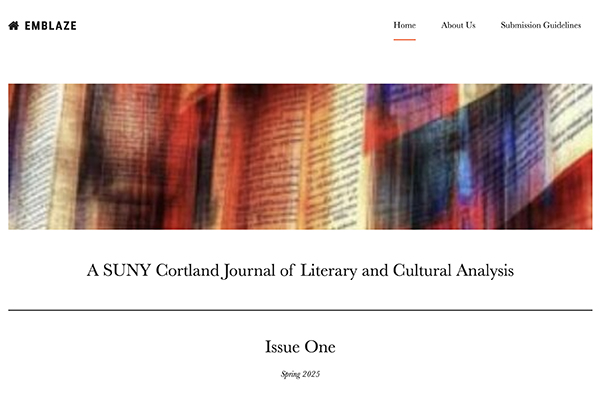
06/10/2025
SUNY Cortland now offers a new journal of literary and cultural analysis, Emblaze, thanks to a English students conceived the online magazine as a spring 2025 class project in which they wrote original articles, edited, designed and released issue one.
Accomplishing all that in a single semester was a tall order. But the students in Danica Savonick’s English course, Publishing Literary and Cultural Criticism, pulled it off.
Emblaze serves as Cortland’s unique outlet for students’ interpretations of poems, novels, TV shows, movies, music, TikTok trends and more.
Within Emblaze’s first issue, one article examines the satirical music of the Satanic-themed band, Ghost. Another looks at feminism in “Barbie” and whether the film keeps up with the feminist topics of the current time. Yet another analyzes the 1978 movie, “Grease,” and its portrayal of fashion, identity and gender.
“We wanted Emblaze to be a journal really focused on cultural and literary criticism and it would be run by students in the English Department,” said Savonick, assistant professor of English.
To avoid duplication, the class first compared other student-produced publications at Cortland. They looked at The Dragon Chronicle, a general student publication that features criticism pieces; Crystalize Review, an English Department forum for student-written poetry, fiction and creative writing; and Hoxie Gorge Review, an English Department student-edited and managed competitive creative magazine solicited from professional writers around the country.
“As you can see in (Emblaze), we really focus on analyses of literary text but also television shows and movies and trying to draw connections between those literary and cultural texts and the broader world,” Savonick said. “We’re looking at how things like race and gender and sexuality are represented in these cultural texts and also how these texts can help us think about the broader world and politics and current events.”
“I've learned a lot about what literary criticism is,” said rising senior English major Aether Sickles of Cortland, one of the three managing editors and co-author of issue one’s Letter from the Editors. “It was a lot of fun trying to figure out as a class what Emblaze would be and look like.”
Emblaze doesn’t simply reference Cortland’s beloved red dragon mascot, Blaze, the editors explained.
“But ‘emblaze’ also means to illuminate — especially by setting a fire — and to adorn something — usually luxuriously. As a journal, we want to ignite interest and discussion surrounding literary and cultural texts and how they fit into the ‘here and now’ of our social and political moment. In doing this, we hope to ‘Emblaze’ new discourse, sparking conversation with you: our readers and fellow members of the Cortland community. Even when the topics we discuss aren’t luxurious or magnificent in and of themselves, we hope that our articles shed light on them in an engaging way.”
“I wanted to create the journal, but I wanted to involve students in the process,” Savonick said. “So, then I applied for the Fine Teaching Award with the goal of creating a course in which the students were creating a journal. It was all motivated by wanting to have a student journal. … and it emerged from that course.”
Sickles described their article analyzing Ghost as “very ‘I-Want-To-Pull-My-Hair-Out’ at times.
“But writing that article was still undeniably my favorite part of the class, and I do think I got several people at least intrigued enough to possibly check out Ghost,” they said.
Sickles, an alum of Tompkins Cortland Community College, in 2023 had an article published in Skeptical Inquirer Magazine on cattle mutilations as part of a class project on pseudoscience. In 2021, they had multiple class films/projects featured in the Cayuga Film Festival. Currently, they’re working on a short fiction story. With all that experience, Sickles still gained insight from having classmates review the Ghost piece.
“Thing is, Ghost is 'Satanic', and that tends to turn a lot of people off,” they said. “I originally was going to write about the way that Ghost tries to create a welcoming environment, etc., but when the class used my first draft to learn to give feedback pretty much everyone agreed that my thesis statement was on the fact that Ghost isn’t Satanic. It’s just used as satire.”
Convinced the world could use more whimsy, Sickles tried to express that in the Ghost piece.
“Let your voice shine through and don’t let your work end up looking and sounding like every other piece out there,” they advised. “Don’t be afraid to voice the opinion you want out of fear that some faceless person will get annoyed about it.”
In a sense, last semester Savonick taught a one-time-only course, because future classes won’t design a journal from soup to nuts.
“The goal is to have the course run again in the future, but the students won’t need to recreate the journal because it already exists,” Savonick said.
“We can focus more deeply on public writing, as a particular kind of skill and genre of writing, as well as the editing and feedback process.” Savonick said, referring to any kind of writing beyond a professor’s assigned term paper, never to be read by others.
Several students who completed Savonick’s course, including Sickles, have volunteered to carry on the journal until a future course offering can prepare new set of editors.
“The students will have more experience and practice getting to write articles for Emblaze,” Savonick said. “We’ll also be able to focus more on training them to edit each other’s writing and give feedback and help each other.”